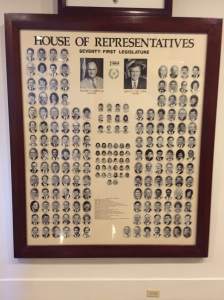Austin is the the capital of Texas. And that is what Doug and me a actually did after he had picked me up from the Megabus-station: drive to the capitol where Texas has his own government and house of representatives and makes his own laws.
The building is beautiful and Doug and me have an excellent lunch in the restaurant: roasted chicken with baked beans and potatoes!
In a very nice conference-room there was a group of six people waiting for us, amongst them: legislators, the lady responsible for prison reform in the state of Texas and the assistant of the chairman of the parliament. Doug installed all my films, pictures and sheets on a computer so that they could be shown. We talked for almost three hours, very intensively and my audience was very enthusiastic and curious about all I presented on society, criminality, prisons, recovery and return. “You literally made them speechless!”, Doug said later. Treating incarcerated persons and people who are vulnerable because they are mentally handicapped or suffer from a psychiatric disease as equal fellow human beings is a difficult issue in Holland but a lot harder in a State which is tough on crime. By the way, I do not agree with the qualification “tough on crime”. I think it is being “tough on vulnerable people”. And that certainly is not a very brave competence……. The people I talk with are well-educated and civilized and they want to end mass incarceration and a more humane juridical system. When I told them that the incarcerated people from the E1 called me “Frans” in front of my boss and explained to her that I am their warden and can be strict and punish, but that I am also an equal human being, the assistant of the chairman said:”this makes all the difference in the world!”.
The most important issue today: “how can we do it in Texas with quick results to convince everybody. We talked about finding a prison governor who is very much part of the systems but also knows that things have to change and wants to move in the right direction if his boss gives him the room to start projects on grassroot-level. And empower the incarcerated people to direct their own lifes and give them te opportunity to learn, work actively and form a network to help eachother. And use the power of meeting: bring people from outside (politicians, companies, communityworkers etc.) inside to meet incarcerated people and find out that most of them are actually talented and loving people. And ask organizations from the community to come into prison to do their work there. And do something about all those poor ill and homeless people in the streets. Train the thousands of uniformed people to care for people instead of bossing, suppressing and chasing them. We exchanged cards and will continue our cooperation in the future!
You probably wonder how I could get in touch with people who work at the capitol and are directly connected with the higher levels of power here. And it is a peculiar story about how things can work! There was a guy who spent 26 years in prison and got his PHD. They asked him to work in the capitol as an experienced worker on legislation. This guy took another position and asked his protege Doug (former bankrobber, almost six years incarcerated, 14 month free) to take his position. So Doug, still under some state supervision, walks around in the capitol of the most repressive state concerning their juridical system! Doug is a very nice, intelligent guy. He has a Master in Social work and suffered from depression. They overdosed him with medication for that and he got addicted. He has a good relationship with his parents and lives there (restored things during his 12-steps program) and worked very hard to help people and being a role-model during his sentence. He is a great guy and I think it is inspiring for all the former incarcerated people in Holland who read this Blog to read about Doug!
Later on we have a meetin at Goodwill with another group of very inspiring people. They have great p[rogramms in which former incarcerated people work and the money earned is invested in programs, education etcetera. There is also a guy from the institute that is the only one that is allowed to give a high school diploma to people above 25. And gets the same funding as “normal” high-schools. They direct themselves to former incarcerated people but try to force their way into prison to educate the people in there. There is also a guy who works at a half-way home with 500 people in it. He tells about the struggle to only start working after the sentence and the incredible problems to get jobs. They are all activistic people, really dedicated to change the system in a positive and effective way. We are talking strategies again: very interesting and very concrete: of of the plans is to invite te wardens office ito the projects, meet the (former incarcerated) students and try to persuade them to let tem work in prison. A great plan and a great group of people.
Doug brings me back to the busstop. But before jumping in we have a great sandwich in one of those typical Austin mobile restaurants. I take pulled pork, because Nel a told me to try that. She and Linda were here last year and the loved this food!

ter visitin


